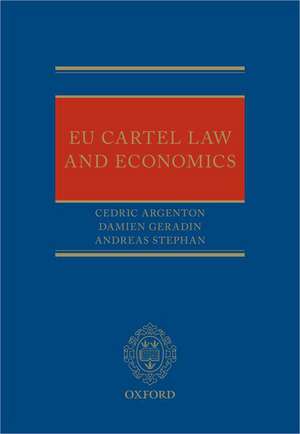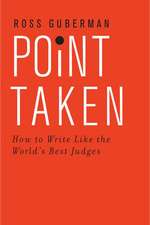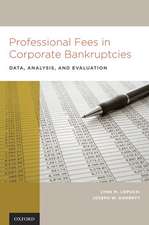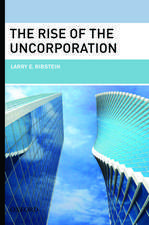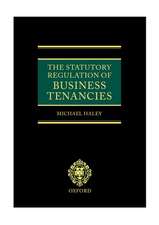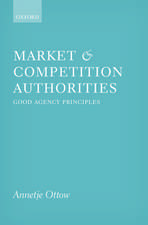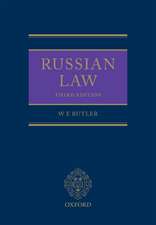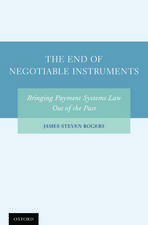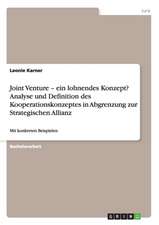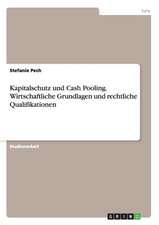EU Cartel Law and Economics
Autor Cedric Argenton, Damien Geradin, Andreas Stephanen Limba Engleză Hardback – 12 noi 2020
Preț: 1345.77 lei
Preț vechi: 2047.92 lei
-34% Nou
Puncte Express: 2019
Preț estimativ în valută:
257.58€ • 267.89$ • 215.85£
257.58€ • 267.89$ • 215.85£
Carte disponibilă
Livrare economică 10-15 februarie
Livrare express 05-11 februarie pentru 263.99 lei
Preluare comenzi: 021 569.72.76
Specificații
ISBN-13: 9780198702092
ISBN-10: 0198702094
Pagini: 336
Dimensiuni: 175 x 252 x 23 mm
Greutate: 0.64 kg
Editura: OUP OXFORD
Colecția OUP Oxford
Locul publicării:Oxford, United Kingdom
ISBN-10: 0198702094
Pagini: 336
Dimensiuni: 175 x 252 x 23 mm
Greutate: 0.64 kg
Editura: OUP OXFORD
Colecția OUP Oxford
Locul publicării:Oxford, United Kingdom
Recenzii
The present book is indeed the first comprehensive study that has been conducted on EU cartel law and economics. It can serve as guidance for scholars, practitioners and competition authorities from both economic and legal backgrounds. The authors succeeded at exploring all the economic and legal aspects of cartel enforcement while emphasizing in their analysis on the main and the most important issues that truly needed reform. Most importantly, they confirmed the fact that economic theory is crucial for the design and enforcement of an effective competition law, including cartel enforcement, which was demonstrated notably by the recommendations and proposals that they have put forward.
This book covers a significant amount of ground, doing this very concisely. It engages with EU law and principles of microeconomics and game theory which can illuminate the competition rules. Both of these are complex disciplines. However, in its engagement, the book neither oversimplifies these matters nor does it engage in overly complicated, highly technical discussions (as many economics-oriented works are wont to do). It is eminently readable and should appeal to both lawyers and economists: to the former for its elegant discussion of the economic insights, and to the latter for its clear discussion of the law.
This is the first comprehensive study of the overall impact of economics on cartel enforcement. The book aims to examine the extent to which EU cartel law is consistent with the economics of collusion and identify areas where greater reliance on economics might be desirable ... The authors also explain the answers to a number of key questions. Why do firms form cartels? Are cartels necessarily a bad thing? What is the social cost of cartels? This book, which is written in a clear, non-technical style, makes the theory, law and practice of cartel enforcement accessible to readers from both economic and legal backgrounds.
This book covers a significant amount of ground, doing this very concisely. It engages with EU law and principles of microeconomics and game theory which can illuminate the competition rules. Both of these are complex disciplines. However, in its engagement, the book neither oversimplifies these matters nor does it engage in overly complicated, highly technical discussions (as many economics-oriented works are wont to do). It is eminently readable and should appeal to both lawyers and economists: to the former for its elegant discussion of the economic insights, and to the latter for its clear discussion of the law.
This is the first comprehensive study of the overall impact of economics on cartel enforcement. The book aims to examine the extent to which EU cartel law is consistent with the economics of collusion and identify areas where greater reliance on economics might be desirable ... The authors also explain the answers to a number of key questions. Why do firms form cartels? Are cartels necessarily a bad thing? What is the social cost of cartels? This book, which is written in a clear, non-technical style, makes the theory, law and practice of cartel enforcement accessible to readers from both economic and legal backgrounds.
Notă biografică
Cédric Argenton is an associate professor of economics at Tilburg University (The Netherlands) and a former director of the Tilburg Law and Economics Center (TILEC). His research focuses on industrial organization, competition economics, and game theory.Damien Geradin is Professor of Competition Law & Economics at Tilburg University (the Netherlands) and the Founding Partner of Geradin Partners, a Brussels-based boutique law firm specialized in EU competition law and intellectual property law.Andreas Stephan is a Professor of Competition Law. He has a background in both Law and Economics and has widely published articles on all aspects of cartel enforcement.
